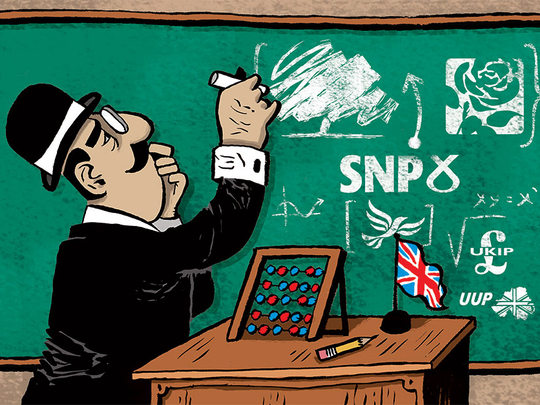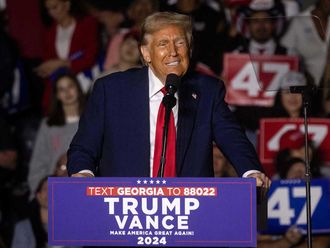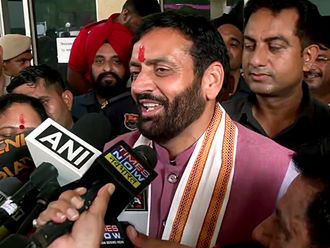
In an uncertain UK election, one certainty is that the Scottish Nationalists under their new Westminster leader Alec Salmond will seek to exert far more influence than they have done for years. This has alarmed everyone, including Labour leader Ed Miliband promising earlier this week to avoid a coalition with them.
Nonetheless, the mathematics of the new parliament may not offer Miliband much choice. The first-past-the-post system means that any party needs to concentrate its support to more than 35 per cent in a single constituency to have a clear chance of winning a seat. A party plugging along with even 20 per cent spread evenly over the whole country may not get a single seat.
Given the current 33 per cent in the opinion polls for both Labour and Conservative and given the way that the Conservatives under the insouciant Prime Minister David Cameron seem to have recovered their bounce while the worthy Miliband still struggles to inspire the Labour voter, a poll of polls indicates that the Conservatives will get 290 and Labour will get 280 seats.
This means the balance will be determined by three smaller parties. The dominant force will be the single-issue Scottish National Party (SNP). While some enthusiasts are predicting their 48 per cent in the Scottish polls will translate into 50 out of the 59 Scottish seats available, this seems high, with a more reasonable 40 to 45 more likely. This will be dictated by how well Labour defends itself against the ScotNat attack, and assumes the struggling Liberal Democrats may face a complete collapse. There was only one Tory north of the border anyway.
The Liberal Democrats are suffering from their links with the Conservatives in the coalition and their current 57 seats look set to be slashed. Anything more than 20 will be extraordinary, and 15 seems more possible. They are struggling to point to any clear achievement from their merger with the Conservatives other than helping Britain stave off the recession in 2010 that might have been very much worse. This is proving an impossible sell.
The biggest no-show may well be the anti-European Union United Kingdom Independence Party (Ukip), which, for two years, has relished dominating the media. They have won two by-elections from the Conservatives and they have 24 members of the European Parliament where it is the largest UK party.
Electoral breakthrough
But they still can only muster 15 per cent in the national polls and that makes any electoral breakthrough very difficult. So despite the craven Cameron’s fears of Ukip, it may well be that the anti-EU party may well get no more than 5 to 10 seats.
These predictions make for some complicated mathematics on the night, particularly as the numbers will change. But the party leaders will have to work with numbers similar to the following:
n Conservative 290
n Labour 280
n SNP 45
n LibDem 15
n Ukip 6
n Ulster Unionists 8
Labour and the SNP will find it easier to form a coalition, given their mutual focus on a more caring society and socialist values. Even though Miliband has said he does not want this, he may need to rethink when reality strikes. His challenge will be to avoid giving the incoming Salmond what the SNP failed to get in the referendum. Also SNP has no interest in making Westminster work and could well be about to sabotage the whole government anyway.
Conservatives’ hopes of working with Ukip would be scuppered by Ukip’s poor showing, so Cameron could ask the Liberal Democrats to continue in coalition as they both share broad UK-focused manifestos. The LibDems would refuse to work if Ukip were included, but the eight Ulster Unionists may be vital to make this alliance work again.
The constitutional convention is now that the largest party gets the opportunity to try first. So in this scenario, Cameron will get his chance. If he finds the maths of a LibDem/Ulster alliance too uncertain, he may be tempted to talk to SNP instead. But that would be a very hard coalition to manage and politically very dangerous for Cameron to try to make work given the way that Salmond ran rings around him during the referendum and almost demolished the Union.
One certainty is that in any scenario, the SNP will have an extraordinary influence with its solid phalanx of more than 40 MPs, willing to obey their leader without question. The danger is that they will judge all issues not on their merits, but by how much they can get for Scottish independence by any particular action, including the possible cynical destruction of good government in Westminster.
A second certainty is that the resulting coalition will be too fragile for the fixed term act to continue. So it is quite possible that the prime minister will regain his right to call an election whenever he wants. The fixed-term term was unique to the Conservatives and Liberal Democrats in 2010 because they had the maths to make a solid coalition and the need to reassure the country at a time of grave crisis in 2010 that firm government was possible. Neither condition applies this time.








